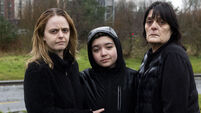Age doesn’t matter, teams need young blood, says Ronan O’Gara

Ronan O'Gara has tried to put himself in the Ireland boss’s shoes this week and he knows all too well that there’s no such thing as a one-size-fits-all solution when it comes to team selection.
The La Rochelle head coach has no doubt his Ireland counterpart has a “massive backbone” and that any difficult decisions won’t be shirked, but there is both an art and a science to the task of choosing 15 individuals for the one collective.















